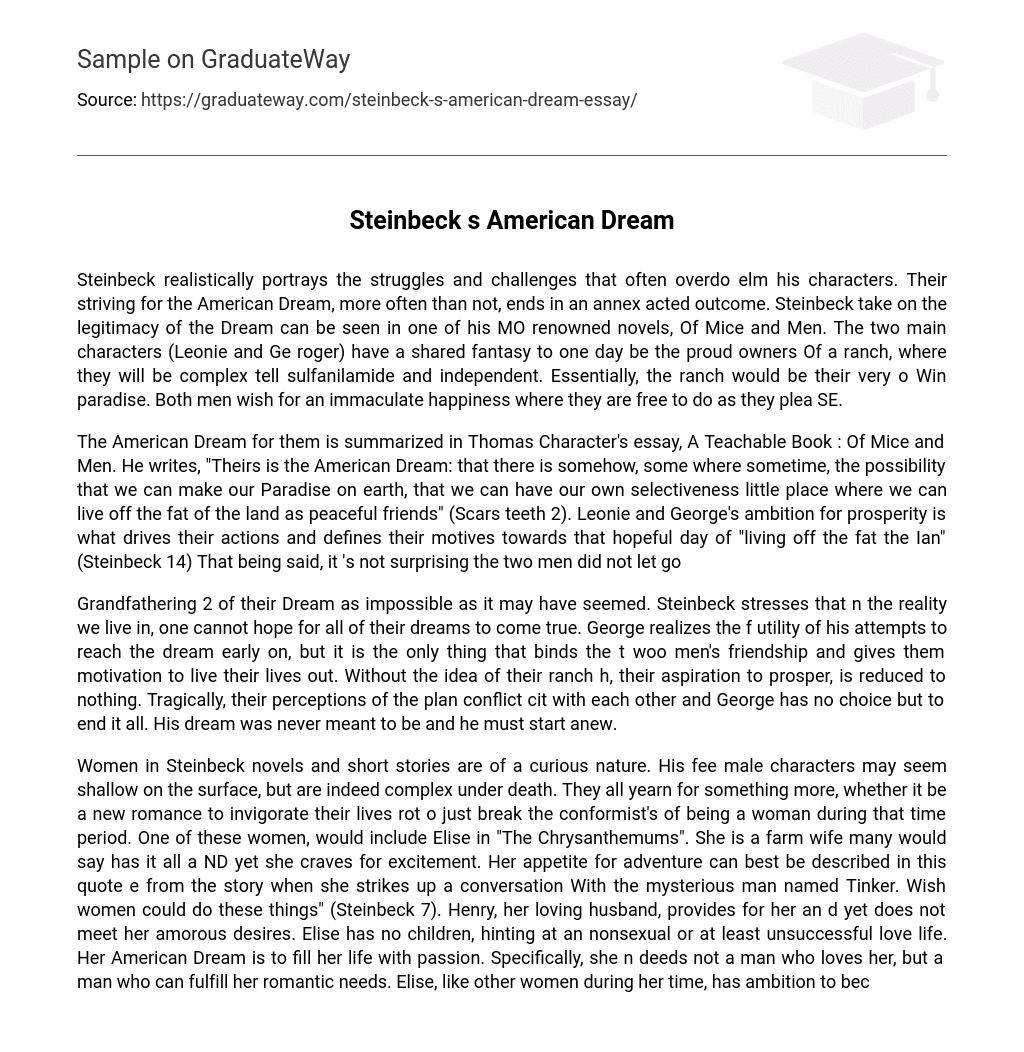Steinbeck realistically portrays the struggles and challenges that often overdo elm his characters. Their striving for the American Dream, more often than not, ends in an annex acted outcome. Steinbeck take on the legitimacy of the Dream can be seen in one of his MO renowned novels, Of Mice and Men. The two main characters (Leonie and Ge roger) have a shared fantasy to one day be the proud owners Of a ranch, where they will be complex tell sulfanilamide and independent. Essentially, the ranch would be their very o Win paradise. Both men wish for an immaculate happiness where they are free to do as they plea SE.
The American Dream for them is summarized in Thomas Character’s essay, A Teachable Book : Of Mice and Men. He writes, “Theirs is the American Dream: that there is somehow, some where sometime, the possibility that we can make our Paradise on earth, that we can have our own selectiveness little place where we can live off the fat of the land as peaceful friends” (Scars teeth 2). Leonie and George’s ambition for prosperity is what drives their actions and defines their motives towards that hopeful day of “living off the fat the Ian” (Steinbeck 14) That being said, it ‘s not surprising the two men did not let go
Grandfathering 2 of their Dream as impossible as it may have seemed. Steinbeck stresses that n the reality we live in, one cannot hope for all of their dreams to come true. George realizes the f utility of his attempts to reach the dream early on, but it is the only thing that binds the t woo men’s friendship and gives them motivation to live their lives out. Without the idea of their ranch h, their aspiration to prosper, is reduced to nothing. Tragically, their perceptions of the plan conflict cit with each other and George has no choice but to end it all. His dream was never meant to be and he must start anew.
Women in Steinbeck novels and short stories are of a curious nature. His fee male characters may seem shallow on the surface, but are indeed complex under death. They all yearn for something more, whether it be a new romance to invigorate their lives rot o just break the conformist’s of being a woman during that time period. One of these women, would include Elise in “The Chrysanthemums”. She is a farm wife many would say has it all a ND yet she craves for excitement. Her appetite for adventure can best be described in this quote e from the story when she strikes up a conversation With the mysterious man named Tinker. Wish women could do these things” (Steinbeck 7). Henry, her loving husband, provides for her an d yet does not meet her amorous desires. Elise has no children, hinting at an nonsexual or at least unsuccessful love life. Her American Dream is to fill her life with passion. Specifically, she n deeds not a man who loves her, but a man who can fulfill her romantic needs. Elise, like other women during her time, has ambition to become something more than just a farm wife; she long s for independence and an exciting life outside the gardens she monotonously tends to every day .
She attempts to reek out her dreary life style by nearly having an affair with Tinker. Despite t hat, she doesn’t pursue and as the Steinbeck American Dream often does, Elise is met with did suppositions. Grandfathering 3 To fully examine the true nature of the American Dream, it’s definition must b concluded. However, this is nearly impossible considering how it changes fro m person to person according to their own mindset. According to Mercilessness’s Dictionary, the e Dream is an “American social ideal that stresses egalitarianism and especially material pro asperity” (Merriment’s “American Dream”).





